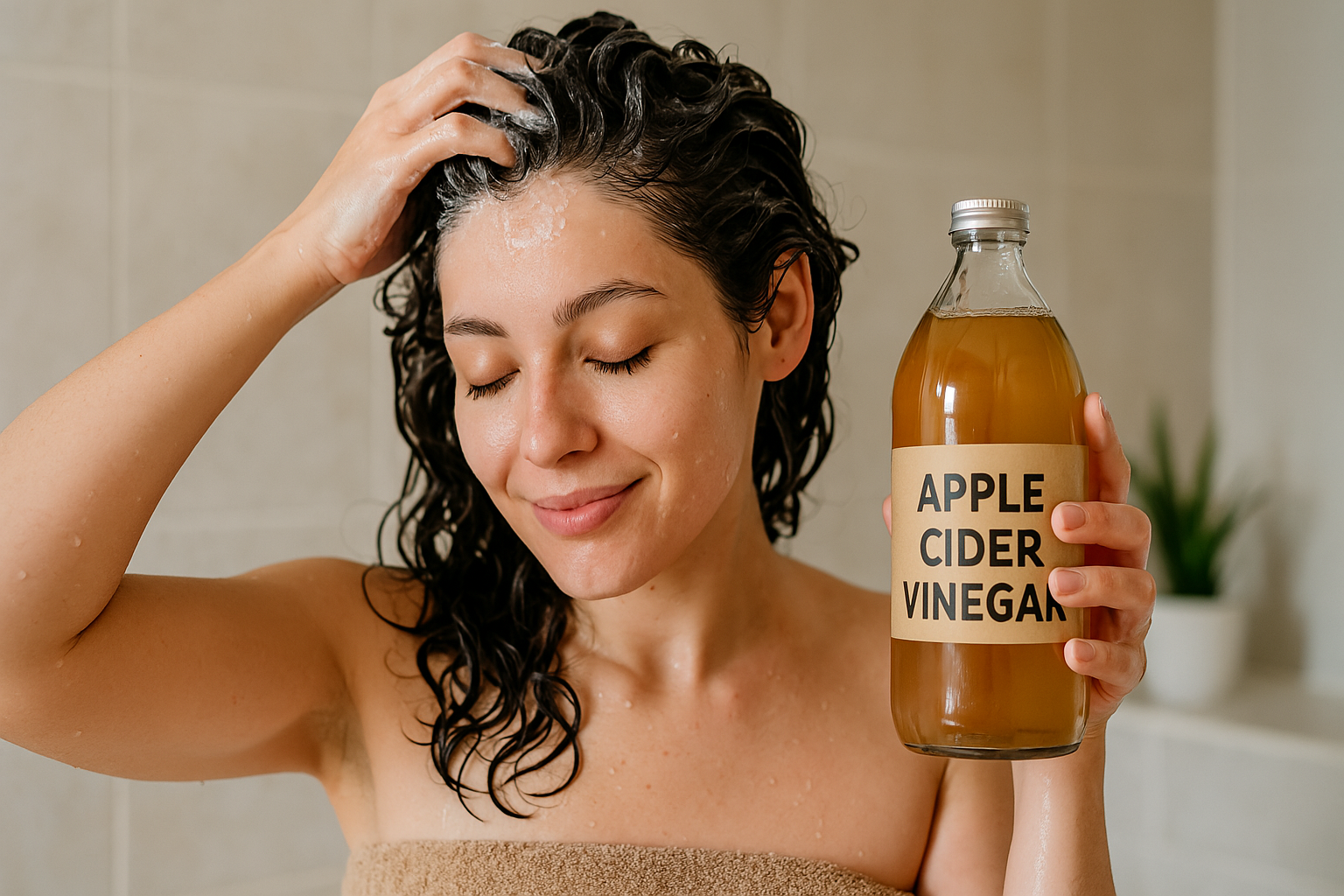Apple cider vinegar (ACV) has long been praised for its health and skincare benefits, but it also has powerful uses in hair care. When used properly as a rinse, it can improve scalp health, restore shine, and help manage issues like buildup or oiliness.
Here’s a complete and evidence-based guide to the top 6 benefits of using apple cider vinegar as a hair rinse—and how to do it safely.
1. Balances the Scalp’s pH
The natural pH of a healthy scalp ranges between 4.5 and 5.5, which keeps the scalp barrier intact and protects against bacteria and dryness. Many commercial shampoos are alkaline, which can disrupt this balance and lead to irritation or overproduction of oil.
Apple cider vinegar is mildly acidic (around pH 3) and, when diluted with water, helps restore the scalp’s optimal pH.
Why this matters:
- Helps reduce irritation and flaking
- Protects the scalp from bacterial or fungal overgrowth
- Promotes a healthy scalp environment for hair growth
2. Removes Product Buildup
Styling products, conditioners, oils, and even hard water minerals can leave behind a film on your hair. Over time, this buildup makes hair look dull, heavy, and lifeless.
An ACV rinse acts as a natural clarifier, breaking down and removing this residue without stripping the hair like chemical-based clarifying shampoos.
Added benefits:
- Enhances shampoo effectiveness
- Prepares hair to better absorb treatments or masks
- Leaves the scalp feeling cleaner and refreshed
3. Adds Shine and Smoothness
Open or rough cuticles on the hair strand cause light to scatter, making hair appear dull and frizzy. ACV helps seal the hair cuticle, smoothing the strand and enhancing light reflection.
This results in:
- Shinier hair
- Less frizz, especially in humid climates
- Better curl or wave definition
4. Fights Dandruff and Itchiness
ACV has antimicrobial and antifungal properties, thanks to its acetic acid and naturally occurring enzymes. These can help reduce the growth of fungi like Malassezia, which is linked to dandruff and seborrheic dermatitis.
Regular use of an ACV rinse can:
- Soothe itchiness and irritation
- Minimize flaking over time
- Complement medical treatments (not replace them)
5. Helps Detangle Hair and Reduces Breakage
By smoothing the outer layer of each hair strand, apple cider vinegar helps reduce friction and tangles, making it easier to comb through wet or dry hair.
This is particularly useful for:
- Curly or coily hair types
- Long hair prone to knots
- Fragile hair that breaks easily when brushed
6. May Help Control Oily Hair
Oily scalps often result from imbalanced pH or overwashing with harsh shampoos. Apple cider vinegar helps regulate sebum production without over-drying the scalp.
Benefits for oily hair:
- Longer-lasting clean feel between washes
- Less need for dry shampoo
- Balanced scalp with fewer grease-related issues
How to Make and Use an Apple Cider Vinegar Hair Rinse
Basic recipe:
- 1–2 tablespoons of raw, unfiltered apple cider vinegar
- 1 cup (8 oz / 240 ml) of water
- Optional: a few drops of essential oil (like lavender, rosemary, or tea tree)
Steps:
- Shampoo your hair as usual.
- Pour the ACV rinse over your scalp and hair.
- Gently massage for 1–2 minutes.
- Rinse thoroughly with cool or lukewarm water.
- Follow with conditioner if needed (especially on dry ends)
How Often Should You Use It?
- Oily scalp or product buildup: 1–2 times per week
- Normal hair: Once a week
- Dry or color-treated hair: Every 10–15 days
Using it too frequently may cause dryness or irritation, especially in sensitive or color-treated hair.
Safety Tips
- Always dilute apple cider vinegar before use
- Avoid contact with eyes—it can sting
- Do a patch test before applying to your whole scalp
- Do not apply over cuts, open wounds, or highly irritated skin

